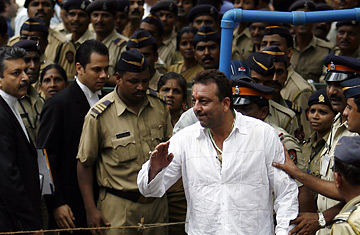
Bollywood star Sanjay Dutt is escorted to court by Indian policemen.
Indian news channels often spice up bulletins with a chutney of Bollywood gossip. But for the last few days, television news itself has begun to resemble Bollywood, thanks to the song and dance over the prison sentences awarded to two leading film stars, Sanjay Dutt and Salman Khan. Serious news anchors have weighed in on what a calamity the prison terms will be for the actors, their families, the film industry and the nation at large, while stories with perhaps more import — the possibility the government could collapse because of the controversial U.S.-India nuclear deal, sa, or terrorist bombings in the southern city of Hyderabad — have been relegated to second or third slot in the lineup. It's a bit reminiscent of another big democracy's obsession with movie stars and their troubles.
For those of you might have missed the stories so far — where have you been? — here are the facts: Film star Sanjay Dutt was sentenced to six years in prison on July 31 for possessing an illegal weapon. In addition to possessing weapons and ammunition, Dutt had also been accused of being part of the conspiracy behind a series of terrorist blasts around Mumbai, India's financial capital, in March 1993, which left 257 dead and 1,400 injured. The bombings followed anti-Muslim riots in Mumbai, which were sparked by the demolition of a historic mosque in the central Indian city of Ayodhya by Hindu extremists. Dutt maintained that he had procured the weapons to protect his family from threats; his mother Nargis, once a leading actress, was a Muslim. In November 2006, Dutt was exonerated of the terrorism charges but found guilty of possessing a weapon. He began serving his term but was out on bail again last week pending an appeal of his sentence to the Supreme Court.
Salman Khan's story is less sensational by comparison. He was charged with shooting endangered gazelles while taking a break from filming a Bollywood flick in Rajasthan in 1998. In April 2006, he was found guilty and sentenced to five years, finally landing in prison last week after losing an appeal of his conviction.
Coverage of the two men is a study in contrasts. Many Indians see Dutt as mistreated. Even the judge who heard his case and sentenced Dutt urged the actor to continue making films after his release from prison. Coverage of Khan, Bollywood's eternal enfant terrible, on the other hand, has been less sympathetic. Television anchors constantly remind viewers that Khan faces charges of shooting endangered animals, in a separate incident, and is also in the final stages of a trial over an incident in which he is alleged to have run over and killed a homeless person while driving under the influence of alcohol.
The TV channels have continued to find new angles to present the same stories and the same footage over and over again. Legal experts and social scientists have been brought out to hail Dutt and Khan's sentences — at the end of court cases that dragged on for 14 and 9 years, respectively — as a triumph of justice over influence, and even stardom.
Film industry experts, however, have mourned the $25 million and $10 million riding on Dutt's and Khan's still-to-be-shot films. And fans have expressed dismay at the "excessive" sentences. This week's big kerfuffle was over a policeman who hugged Dutt after his release on bail. The officer was suspended for inappropriate behavior, but was later absolved at a local politician's request.
It has grown surreal enough that TV channels, and even respectable newspapers, have started calling Sanjay Dutt "Munnabhai," after a character in one of his recent hit movies — a gangster who discovers Gandhi's philosophy and transforms his life. Just as in America, the controversy seems to have only stoked Dutt's fame, and at this point his fan base rivals the Britney Spears fan club. With the controversy around the nuclear deal threatening the close ties between Washington and New Delhi, perhaps the two countries' shared celebrity obsession is just what's needed to keep the strategic partnership going.
